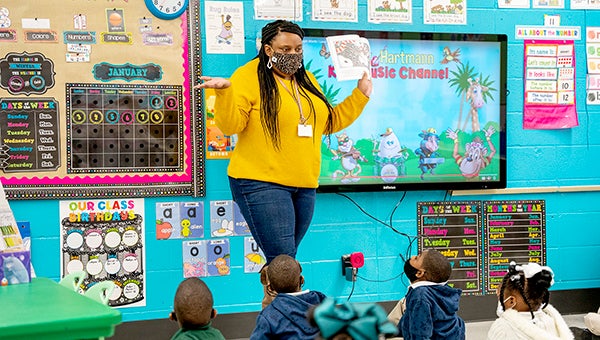Nichols builds strategies believing every student can thrive
Published 12:05 pm Monday, February 8, 2021

- Warrenton Elementary School pre-K teacher Alyson Nichols leads a reading lesson in her classroom recently. (Cedric Tillman/Vicksburg Warren School District)
This article is part of a series by The Vicksburg Post, in partnership with the Vicksburg-Warren County Chamber of Commerce, featuring each of the Educator of the Year nominees.
For many of the children in Alyson Nichols’ pre-K class at Warrenton Elementary, her classroom setting is likely the first time they have been in this kind of environment. They are learning how to be students, learning the very fundamentals that will propel them into kindergarten and beyond.
It also marks a chance for these students to learn how to interact with one another.
“I believe in building a relationship and having mutual respect for one another is most important,” Nichols said. “There is no limit to what you can do and I foster that in kids.”
Nichols is a finalist for the Vicksburg-Warren County Chamber of Commerce’s Educator of the Year Award.
The Chamber will select and announce one elementary and one secondary teacher of the year on Feb. 17. The winner of each award will receive $1,000 from Ameristar Casino and the runner-up for each award will receive $500 from Mutual Credit Union.
Nichols earned an early childhood education and child development degree from Alcorn State University in 2016, and for the past five years, has taught pre-K at Warrenton Elementary. The Vicksburg Warren School District provides pre-K classes in each of the District’s elementary schools, with the exception of Bowmar Elementary.
Nichols said most of her students begin the year only knowing the letters in their name, but she sets a goal that each of them learn nearly the entire alphabet. She also works to connect her lessons to the world the students live in.
“My phrase is ‘let’s close our eyes and think about what we would see,'” Nichols said. “If students can relate to what they are learning, it becomes familiar to them, which I feel makes it easier to apply.”
She said some of her teaching strategies involve inviting speakers, videos, activities and conversations to “find a way to make a connection.”
“I try and make sure that the lessons are relatable, something that can connect students to the world,” she said. “I believe every child can learn, especially if they can relate.”






